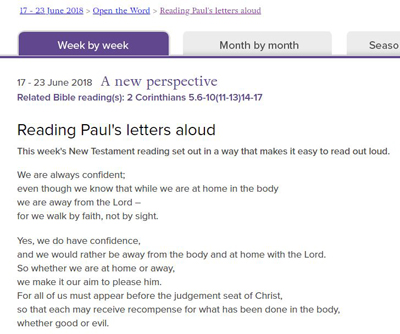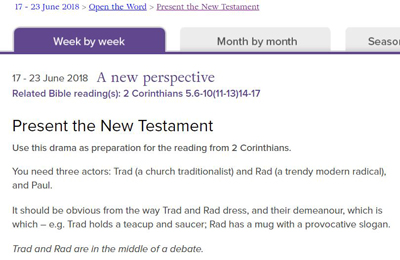An introduction to the weekly resources on Paul's letters

Encouraging and supporting biblical literacy
When ROOTS has the Gospel passage as the main focus, our aim is to encourage greater biblical literacy by hearing the Gospel writers’ voices as individual and distinct from each other. This enables us to consider how the context of the writer and the audiences they were addressing influenced their accounts of Jesus’ life and ministry. We also draw out the links between the Old Testament reading and the Gospel.
Listening to Paul’s voice
During Ordinary Time, when the lectionary gives us extracts from Paul’s letters, we can turn to Paul and hear how these earliest writings about the good news of Jesus Christ speak clearly to us today. Rachel Nicholls, one of the contributors we’ve been working with on our latest Paul materials, describes our hopes and intentions for these resources:
‘In one sense, the words of one of Paul’s letters interact with us more directly than even a Gospel narrative, where the narrator (and the narrator’s motives) are largely hidden from view. Here we are hearing ideas and challenges directly from Paul to the recipients of his letters so, if we can only find a way to join in that conversation, we can have a fresh and immediate experience of Scripture.
To listen to Paul is to realise that theology is something that you do, not something that you simply receive. It is something that you make in the meeting place of your beliefs and your experience, and in conversation with others. It is neither detached from the events of life nor solitary. We all have experiences in life and all will be using ROOTS' notes in some kind of community, so this qualifies all of us to join in this conversation about living the faith.
People have been writing about and interpreting what Paul was saying for years. Let’s join in and listen to his voice in our churches and communities today – not so very dissimilar from the society in which they were first heard.’

Exploring Paul’s writing with the whole church community
It might be tempting to say that Paul’s writings are ‘too difficult’ for children but we think that, with support, children can hear and learn from Paul just as young people and adults can. The ROOTS' resources focus on the same Bible reading across the whole age range so that everyone has a shared experience, whether they meet all together, or in different groups. However, in the Children & Young People resources. instead of working with the whole of the lectionary reading from Paul’s letter, we have taken an extract that holds a ‘nugget’ of what Paul is saying at this point in his letter. The resources for children focus on this shorter reading, making it possible to hear and explore a key idea of Paul’s within one session.
See also issue 99 pp2-3 for our recap on using Paul's resources all ages, alongside positive feedback from ROOTS subscribers.
When will the weekly resources focus on Paul’s letters?
Additional resources to support our reading of Paul’s letters
Paul’s language is not always easy to understand. He dictated his messages in the contemporary style of a speech, using persuasive arguments expressed in metaphors and analogies that are unfamiliar to us today. If we are going to listen and respond to his teaching, we need to be able to make sense of it. We have prepared additional resources that provide background knowledge to help our understanding.
Reading passages from Paul’s letters aloud
Paul’s writings are not the easiest to read aloud in a service of worship. If you have a lectionary book, either lectern or pew size, you’ll find it set out in a way that is clear to read out, rather than in the continuous text of a normal Bible. We have produced similar versions in the Open the Word section that can be printed and given to readers. Do encourage practice beforehand.

Additional ways of presenting the reading
Each week we also offer a dramatisation or other way of presenting the reading. Do consider using these ideas with adult congregations as well as at times when everyone is together, perhaps in addition to hearing the passage read aloud. Listening to Paul’s writing isn’t straightforward, so giving the congregation the additional support of hearing a drama or other alternative presentation will help them to become more familiar with it.
